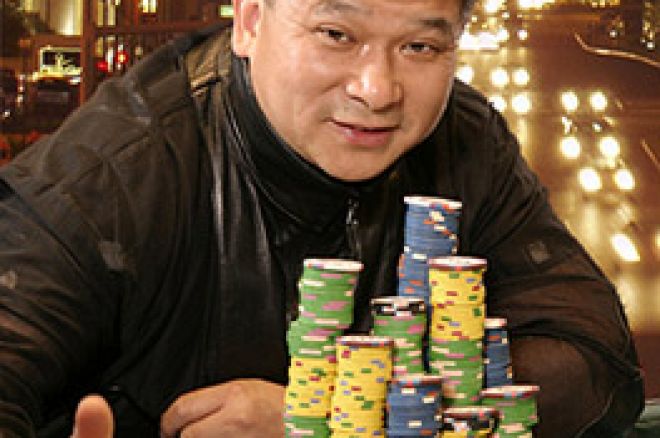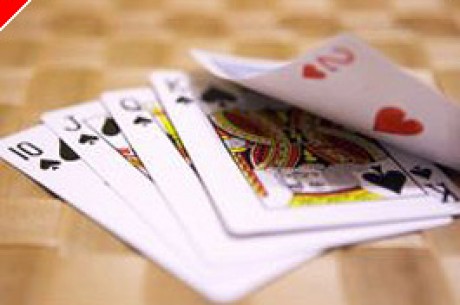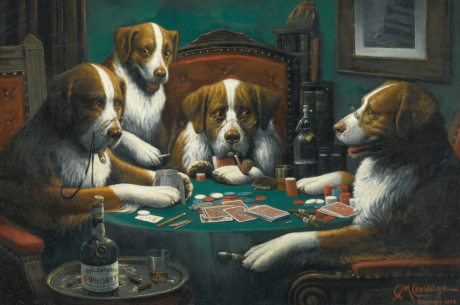Poker Book Review: 'Million Dollar Hold Em'

Who is the greatest poker player in the world? No doubt that for many, the first name to come to mind would either be Doyle Brunson's or Chip Reese's while others might identify Daniel Negreanu, Phil Ivey, or Allen Cunningham, but, for a generation of players baptized into the game by the movie Rounders, Johnny Chan's name would be the first one on the list. In the film, Chan is described by Matt Damon's character as the embodiment of the quintessential poker master. He is also the yardstick by which he defines his success in a later sequence. Of course, there are excellent reasons for any rounder's admiration of the Orient Express. He has won 10 World Series of Poker bracelets along with cashing 33 times over the course of his WSOP career.
Chan has now released, with the aid of co-writer Mark Karowe, a new strategy book entitled Million Dollar Hold'em: Limit Cash Games. This is his second book; Play Poker Like Johnny Chan came out in 2005. His authority and clout as a player cannot be questioned, but, before this year's World Series of Poker Main Event, he was not often described as being a great teacher or instructor. However, due to the emergence of Jaime Gold, Chan's star pupil, all of this changed. The camera frequently captured Johnny sitting on the side closely monitoring the progress of his student. Gold had a luck-filled ride through the main event, and he eventually decimated the field and is now World Champion. Many pros were skeptical of Gold's talent which had the effect of strengthening Chan's reputation. His coaching added more luster to his already sterling image.
Unfortunately, Million Dollar Hold'em is not the type of timeless work which will bolster his legacy. It will not make novices into average players nor average players into stars. Overall, it is a rather forgettable offering, and one that fails to enhance our cumulative knowledge of the game. Certainly though, it does possess some positive aspects. The tips concerning the specifics of a professional's life and career are illuminating. Some of its advice is quite practical such as the way it highlights all the major and minor things one should look for before selecting a card room. Game quality is mentioned along with which seat to occupy in relation to other players as are essential elements of casino safety and geographic proximity. His bankroll section is also helpful as Chan recommends having at least 500 big bets for whatever limit you play. The observation that one must play no lower than the 3-6 limit to have any chance of beating the house rake was excellent. There's no doubt that it is a point lost on many a Vegas 2-4 tourist. Furthermore, the design of the book is reader friendly. Its font and table diagrams are large sized which increase its comprehensibility. The "Key Concepts" summaries, which are included for every hand example, magnify its clarity.
The biggest problem though is that there is little that is new here. The Introduction states that, "many of the ideas in this book have never appeared in print before. It is certainly to your advantage to be one of the first to understand them all," yet this reviewer cannot think of any concepts or plays which were novel or previously unknown. This is a disappointment as sharing secrets and learning new information is why most of us spend so much of our earnings on instructional materials. Sadly, Million Dollar Hold'em does not live up to its own hype. What's even worse is that many of its examples could actually prove detrimental for a novice's understanding of limit hold'em and his ensuing performance.
Frankly, the overly optimistic results which are described in the individual limit scenarios proved baffling. The river outcomes will not remind readers of the games they actually play. They are more reminiscent of the way we would like to see the action go than of the action which we in fact witness. By the reviewer's count, forty-four out of the fifty-five hands not decided pre-flop end in victory for the hero. A ratio that skewed was alienating as it seemed like everything the player did worked out in the end. Is that limit hold'em? There were few surprises as his value bets and bluffs got continuously rewarded. Such a plot has more in common with a poker movie than with an actual limit poker game.
Recall that Barry Greenstein, in his Ace on the River: An Advanced Poker Guide, reported winning only 58 percent of the time at limit. This figure makes Million Dollar Hold'em's 80 percent win ratio seem like it was tallied up by Mary Poppins. Furthermore, the opponents described have little in common with the ones you'll find today. They all seem to be weak tight—except for when they don't have a hand, then they become loose-passive. We see a villain with K-8 suited call on the river with his king high (it is unknown as to whether or not he was surprised by not having the best hand). Generally, most of the opponents have in common a yen for folding regardless of whether or not they get the odds to draw out.
As for Chan's strategy, some of it is rather unusual to say the least. A case in point is the one found on page 293, wherein an A-10 of spades reraises with three players still to act on a board of 4-5-3-3 (one spade). Did it work out for him? You bet. All of the players fold including the original raiser which suggests that strange days are afoot. Chan has his sample player take many risks like three betting post-flop with AJ unsuited on a rainbow board of 9-2-3. Then, he wins by default with his ace high as the other player folds on the river to a bet despite there being 8 big bets in the pot already. There were no sequences presented like the ones which drive so many players out of limit altogether. You don't see a set losing to a straight or a straight losing to a flush or a flush losing to a full house. For this reviewer, all the optimism lessened the book's believability and worth.
If the Orient Express really wanted to be of service to readers then he would magically transport us to whatever location which held the games depicted in these examples. Your average limit player would be most grateful as he would immensely profit from raising to death the lightweights who fold their way across these pages. Should the reader be new to the game or just starting out in limit hold'em, then they would be advised to spend their money elsewhere. Manuals like Small Stakes Hold 'em: Winning Big with Expert Play, Winning Low Limit Hold'em, and How Good Is Your Limit Hold 'em? are all recommended over this one. In summation, Johnny Chan is a master and could easily write a superb poker tome, but he certainly didn't do that here.








